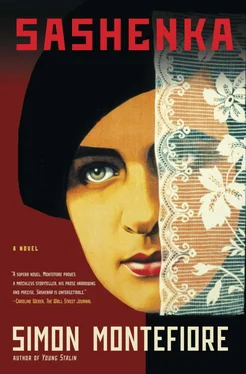“I have nothing to confess. I am innocent.”
“Then how do you reconcile the fact of your arrest with that declaration of innocence? Do you think I’m a clown and Comrade Beria’s just passing the time of day?”
“I don’t understand it myself. I can only think it’s a mistake or the result of a misunderstanding caused by some coincidences.”
“The Party doesn’t recognize coincidences,” said Mogilchuk. “You saw Comrade Investigator Rodos in Comrade Beria’s office? He’s quite a man, a legend in the Organs, more like a dangerous beast: we have to stop him killing prisoners all the time. In fact, he’s damaged quite a few people close to you this very week. He says he gets a red mist before his eyes and forgets himself. He hates our sort, Sashenka. He hates intellectuals! You might have to meet him soon if you don’t disarm. But you’re in luck. I’m going to give you one more chance: I am going to introduce someone who might jog your memory.”
He picked up the telephone on his desk. “Deliver the package!” he said genially.
He smiled at Sashenka, removed and replaced his spectacles, and checked his pompadour. They waited in silence. The phone rang.
“Yes, yes, comrade, we’ll wait for you.”
Mogilchuk left the room for a moment and then returned. “Just making sure everything is just so.”
“Can I have a glass of water?” Sashenka repeated Vanya’s instructions to herself and then, under her breath but still moving her lips, she chanted, “Snowy, Carlo, Cushion, Bunny.”
Mogilchuk was pouring her out a glass when the door burst open and Kobylov pretended to creep in, raising his huge shiny hands with the many glistening rings.
“Pretend I’m not here, Comrade Investigator. I’ll hide over here in the corner!” Just like a headmaster sitting at the back to observe a teacher’s class, the fragrant giant leaned against the wall and crossed his boots.
There was a knock on the door.
“Your show!” Kobylov whispered and wrinkled his nose at Sashenka. She looked away. “Tired?” he hissed.
“Enter!” piped up Mogilchuk. “The confrontation starts now.” The door opened. The torturer from Beria’s office entered. “Welcome, Comrade Rodos,” Mogilchuk said.
Butterflies of physical fear fluttered in Sashenka’s belly. Rodos moved slowly as if made of rusty steel. He nodded at his comrades and then looked Sashenka straight in the eye. He sat down in the chair next to Mogilchuk and started to play with the long red hairs of the mole on his chin. This was the Sashenka team: Kobylov was in charge, with Mogilchuk and Rodos as the soft and hard men. Just to break her? No, they must be working on some bigger case, she thought; one that involved poor Mendel. Her natural optimism, barely still beating in her breast, told her she would survive this. No one had yet broken, that was clear.
So who were they bringing to surprise her? She had already seen Mendel—a heartbreaking, dreadful sight.
If it was Vanya, and he had told lies against her, she would understand that, under the ministerings of Rodos, he had crossed into the other world: she would still beam her love at him. She would not confess: she could still survive.
If it was Benya, darling Benya of the eight stars, of the seven thousand rubies, he was beyond blame now. She had rung him that day to say “I love you.” Now she loved him once more, convinced he was as innocent as she. If she never got out of the Lubianka, she would always be grateful that she had known such a love.
But she would not confess, whatever anyone said, because she was still innocent. And if she did not confess, she would one day be freed. And she would reclaim Snowy and Carlo. It was all for them now.
The door opened.
Sashenka looked down at her fingers with terrible foreboding. This was it.
She sensed, through her peripheral vision, a wizened figure hesitating in the doorway.
“Sit down, prisoner,” said Rodos, pointing at the chair facing Sashenka on the T-shaped conference table. “There!”
A skinny old man in blue prison overalls hesitated again, pointing at himself. “Yes, you! Sit there, prisoner. Hurry!”
A bolt of expectation hit her. Was it her father? She gulped. Was he alive? Had he testified against her? It did not matter: if he was alive, she would be jubilant.
Love welled up in her for her father, her mother, her grandparents, all of them.
Papa! Whatever they’d done to him, whatever he’d done to her, she just wanted to hug him. Would they let her kiss him?
“Accused Zeitlin-Palitsyn!” barked Rodos. “Face the prisoner.”
Esteemed Josef Vissarionovich, dearest Koba,
I write to you as an old comrade of over twenty-five years, during which time I have served the Party and you as its ideal personification without once deviating from the Party line. I believe I owe my successful career as a responsible worker in our noble workers’ and peasants’ Party to your trust and kindness. I will obey any order of the Central Committee as I have always done, but I wish to protest at the methods of “investigation” used on me by the workers of the Organs. I suffer from ill health (a shadow on my right lung; angina and cardiac failure as well as physical weakness from childhood lameness and severe arthritis from hard labor and prolonged exile in Siberia during the Tsarist times) and I am now aged sixty-one. As a member of the Central Committee, I wish to report to you as General Secretary and Politburo member that on arrival here in the Internal Prison at the Lubianka, I was asked to confess to serving foreign powers. When I refused, I was forced down onto a carpet and beaten on the feet and legs with rubber truncheons by three men with terrible force. I could no longer walk and my legs became covered in red and blue internal hemorrhages. Each day, I was beaten again on the same places with a leather strap and rubber truncheons.
The pain was as intense as if boiling water had been poured on me or acid had burned me. I passed out many times, I wept, I screamed, I begged for them to tell you, Comrade Stalin, what I was enduring. When I mentioned your name, they punched me in the face, breaking my nose, my cheekbone and my glasses, without which I can barely function, and they started to beat my spine too. My self-respect as a Bolshevik almost prevents me from telling you more, Illustrious Comrade Stalin, and it pains me even to say this: when, lying in a shuddering heap on the floor, I refused again to tell the Party lies, the interrogators relieved themselves (and, in doing so, polluted the name of our sacred Party of Lenin and Stalin) on my face and in my eyes. Even in the katorga hard-labor camps under the Tsar, I never endured an iota of this fear and pain. I am now in my cell shivering in every muscle, barely able to hold this pen. I feel such overpowering fear, I who as a revolutionary of thirty years have never experienced fear, and a terrifying urge to lie to you, Josef Vissarionovich, and to incriminate myself and others, including honest responsible workers, even though this itself would be a crime against the Party.
I understand that our great state needs the weapons of terror to survive and triumph. I support our heroic Organs in their search for Enemies of the People and spies. I am not important. Only the Party and our noble cause matter. But I am sure that you do not know of these practices and I urge you, esteemed old comrade, Great Leader of the Working Class, our Lenin of today, to investigate them and alleviate the sufferings of a sincere and devoted servant of the Party and you, Comrade Stalin.
Mendel Barmakid, Party member since 1904
A cadaverous old man with yellow translucent skin and tufts of pale hair on a peeling, scabby scalp sat opposite her in blue prison uniform. He sucked his gums, jerkily glanced around him, and scratched himself in bursts, rolling his eyes, followed by long minutes of comatose stillness.
Читать дальше












